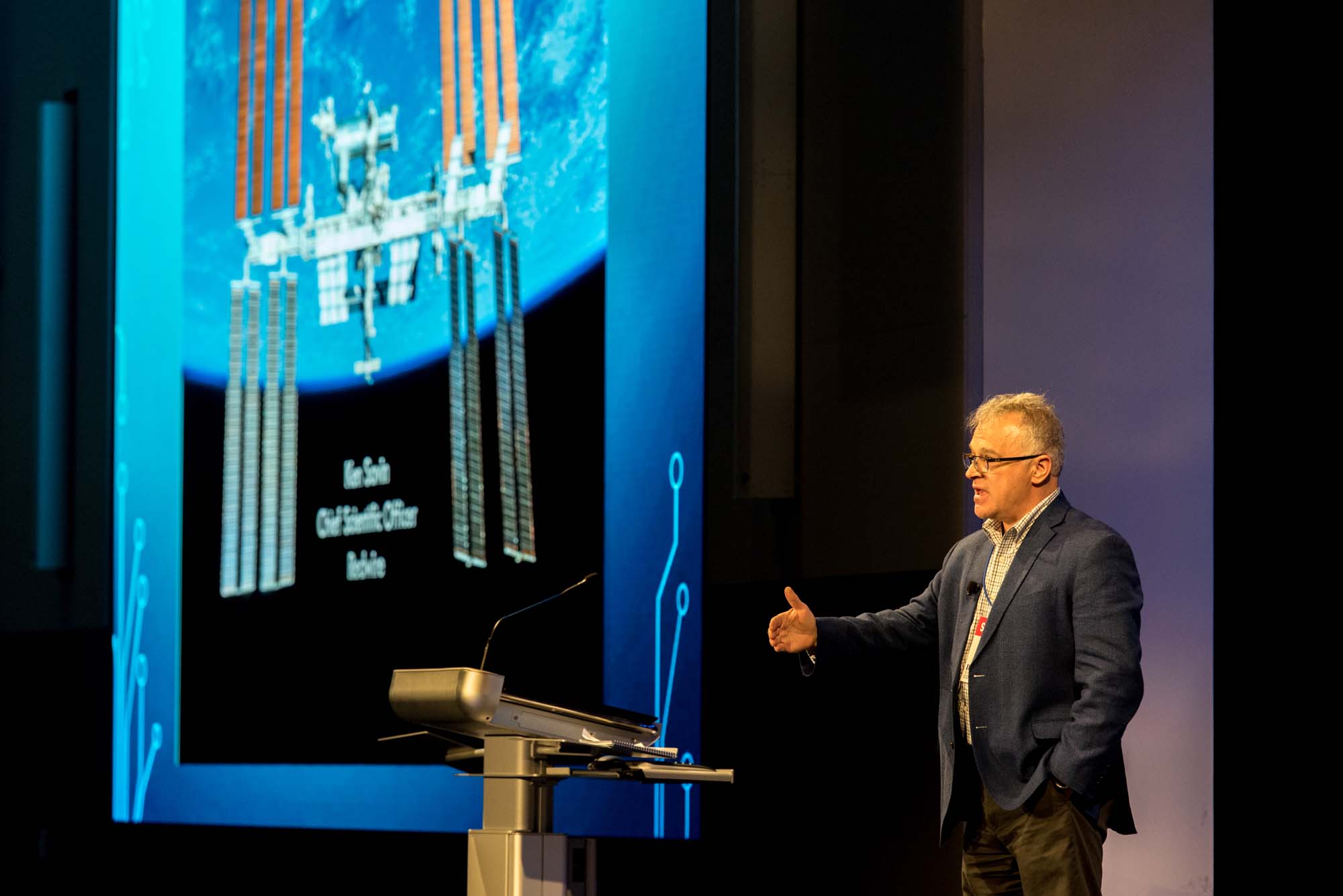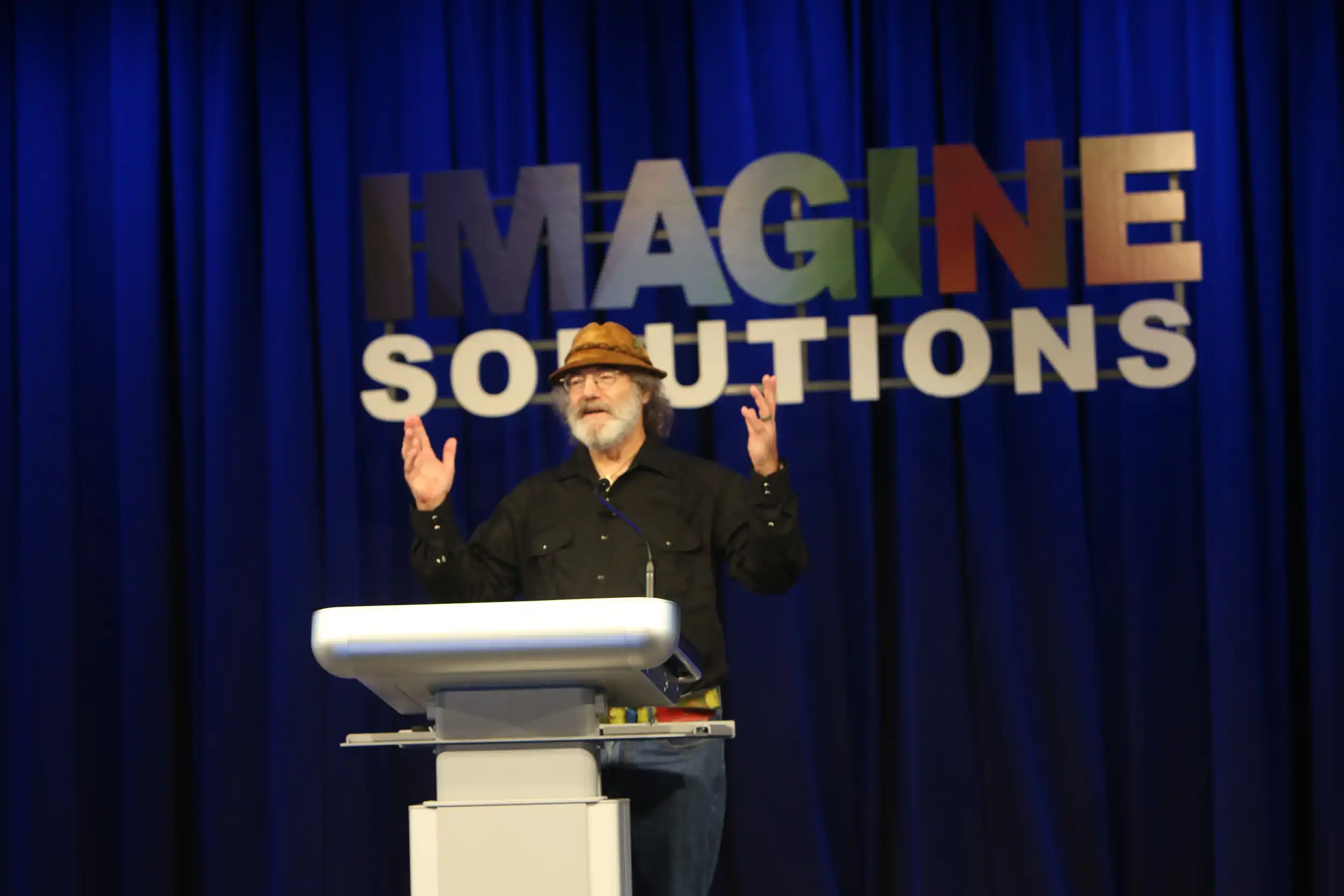David Aguilar, Astronomer Extraordinaire
David Aguilar takes you on a space adventure showcasing the planets as you have never seen before.
00.00
he is an internationally recognized naturalist astronomer author space artist and musician with the unique ability to open minds to the vast frontiers of space and their potential effects on our own world among many other accomplishments he joined NASA's new Horizons mission media team for the historic flyby of Pluto and then he rejoined that team again in 2018 2019 for the Ultima Thule Kuiper belt flyby to the farthest object ever explored in our solar system it is no stretch to say he is far out he is David Aguilar please welcome well thank you my friend I think on behalf of Ronnie and Randy I would like to say welcome to any of those that are visiting earth for the very first time welcome to be here as an astrophysicist I have learned a little trick and I will share it with you and
01.01
you can certainly use it yourself as an astrophysicist I work in the universe that is part of what I do when I'm on an airplane and I sit down and there's somebody next to me I really do not want to have a conversation with the rest of the flight and they asked me what I do I simply tell them I'm a mathematician if I do want to talk to them I tell them I'm an astronomer and the first question they ever asked me is is there life out there in the universe do I believe in aliens and for the next few moments we're going to explore this because I have some information that may surprise you it may change your view just a little bit and at the end I'm going to leave you with something I suspect you're going to think about for a few days to come now as a young boy growing up I absolutely loved science fiction science fiction to me meant so much all
02.02
the movies of aliens coming to Earth invading wanting something from us willing to take our women away with them into space as a young boy I was fascinated my room was filled with butterfly nets Gilbert microscopes little telescopes I just absolutely loved astronomy and to grow up and have that part of my life was a really remarkable opportunity but also as a scientist we look for signs we look for things around us that can tell us things and and this is nothing new humans have always looked at signs as they've looked around them moving through this world so today we're going to talk about signs now we're used to signs we see them around us everywhere they are bombarding us with information sometimes useful sometimes not however it is part of our world in these signs that we may see it may be signs of all
03.01
Streeters we just found out what's going on this morning it may be an odd lump on our back that is an indicator something is not quite right it may be actually the foundations of our house we were just going to buy and we have second thoughts about that one because it doesn't look too stable these are signs we look at but it goes back to the history of our species if you walked into a cave and saw this you might think hey somebody else has been here and the hunting is good in this area you might if you were one of our early ancestors walk out and see this on a tree and you would say bear there is a bear nearby and these claw marks are fresh you might see a tree that looked like this and you'd say big buck he's losing his antlers he's around here somewhere he's rubbed the bark off the tree and if you moved out and you went into a cave and saw this you would say two things wait a minute these are human bones and those are cut
04.01
marks on those bones there are cannibals nearby maybe it's time to move on so we've always been attuned to signs that surround us in the universe well right now the earth is sending us a big sign some people are seeing it some people are not we have glaciers melting we have flooding this was just taken last week in the Midwest we have fire that have swept through Australia and California and Indonesia the world is sending us a sign that things are not quite right on this planet it's up to us to recognize them but what if the universe is sending us a sign excuse me a second can we get the volume up on that what if the universe is sending us a sign and we're not paying any attention to it we're not hearing it this is my field this is what I work in
05.01
and in back doors astrophysicists are beginning to ask some very strange questions about who we are and where we are in occupying this universe and this is what they're talking about the universe to us is silent you may hear an owl you may go outside at night and hear animals around you but as you stare at this ocean of stars it's silent it says nothing to us and this is absolutely wrong because the universe is teeming with noise we just don't have the ears to hear it if we were to look at the universe this is what our Sun sounds like [Music] this is what most stars sound like this is what the planet Mercury sounds like there's Venus ever wonder what the
06.05
earth sounds like as it moves through space there it is how about Mars Jupiter sounds industrial spooky Uranus sounds like a windstorm Neptune is a little bit quieter and Pluto rings like a bell these are the vibrations inside the planet sound we can hear the remains of supernovae that have exploded through the universe and believe it or not we can hear the remains of the Big Bang this is what the beginning of the universe sounded like it still moves through
07.02
you're hearing the real thing [Music] but oddly enough except for the sounds created by the objects out there the universe in every other way is completely silent except for this planet but it's all one things and just remember but you're seeing in what your dream is not what's happening [Music]
08.08
[Music] except for this one planet that is broadcasting into the universe the rest of the universe is silent now this is the Milky Way galaxy this is the home most of us live in it's about 200 to 400 billion stars every one of those stars have solar systems around them and many of them have identical planets to the planet Earth so there's plenty of homes out there for creatures and aliens to live on but in the last 60 years we have been listening and within a hundred light-years of Earth we have sampled over 200,000 solar system with earth-like planets in them and they are dead silent we are just finishing our next survey about 1,000 light years away
09.01
three and a half billion stars and the universe is silent which brings us to wonder what's going on out there so these are seven ideas that astrophysicists are discussing over a glass of scotch on a Friday night in a back room as to what's going on in this universe and why we're not seeing more aliens first of all the distances between the stars are too far for anybody to travel for anybody to make contact with and this comes to numbers we are terrible with numbers we're wonderful at using them but terrible at understanding I'm gonna give you an example billion how many of you work with this number how many of you know that exactly that's what it looks like nine zeroes behind a one so you're familiar with the billion let's find out what happened two billion seconds ago I'll give you a moment what happened a
10.02
billion months minutes ago what happened a billion hours ago what happened two billion days ago go ahead talk among yourselves come up with the answers what happened a billion seconds ago oh it was 1983 what happened a billion minutes ago Christ walked the earth what happened a billion hours ago Neanderthals walked the earth and a billion days ago nothing walked upright on the earth so we have numbers that we're familiar with but sometimes they don't quite register a Lightyear is what astronomers use miles are useless to us we call it a Lightyear many of you understand a Lightyear many of you don't quite a Lightyear is the amount of time it takes light to travel one year across space it's a speed it's about 186,000 miles per second our for rounding it off it's about six trillion miles an hour six
11.04
trillion miles how does this relate to us well when you go out today and that Sun shines on your cheek can you say oh it's so nice to be in sunlight that light actually left there nine minutes ago traveling at the speed of light it's taken nine minutes like a FedEx package to travel through space and reach you so you're seeing the Sun as it was nine minutes ago if you were to take a look at Jupiter which is in the morning sky right now the light left there 42 minutes earlier if you were to look at the closest planet outside of our solar system which we've identified in Alpha Centauri the Proxima Centauri system it's an earth-like planet the light left there 4.3 years ago in other words if you could travel the speed of light it would take you four point three years to get there and four point three years to get home but we can't travel the speed
12.00
of light we can't even begin to come close to it so with the best propulsion systems we have today it's roughly going to take us 250 years to make that journey one way 250 years to come home so the distances of space are tremendous and that's nearby that's the closest start of the earth if you see the Andromeda galaxy the little hazy patches in the sky at night the light left there 2.2 million years ago traveling at the speed of light it would take you 2.2 million years to get there and we can't imagine anything that travels faster than the speed of light so consequently the distances may be too far in the universe for us to really communicate and connect up with aliens here's the second point evolution does not necessarily lead to intelligence we think it does because we're the top of the list but evolutionary scientists will tell you no we're a fluke we won the lottery to be here do not expect on
13.03
other worlds the ultimate goal of evolution is intelligence it's not going to happen take a look at the earth at our planet the most successful life on this earth are bacteria protozoans sponges they're everywhere starfish echinoderms jellyfish worms and trees and what do all of these have in common none of them have a brain you do not need to have a brain to succeed on planet Earth which I did not want to get into politics but you never know there are indicators so brains are not necessary on a world through evolution the third part we're looking at everybody's listening nobody is
14.00
answering and this comes right back to Stephen Hawking who said trying to communicate with aliens we potentially endanger humanity because a distant alien civilization might not view us as inferior zat might view us as inferiors weak imperfect to conquer and this is based upon our own history and what we've seen when cultures clash and one is slightly ahead in technologies the ones that are behind seem to always come in second so maybe everybody is listening but it's a good idea they don't know that we're here and they're not broadcasting that they're there number four acts happen this is a big one for us on planet earth because if you take a look at the history of our world a history of life within the last half a million years you will find that we have what's called punctuated evolution there have been major disasters on earth a little
15.00
while back about 420 million years ago we lost 86 percent of all the life on earth back at about 360 million years ago we lost 75% of all life on Earth going back a little bit further to the great die-off we lost about 220 million years ago 96% of all life in the oceans and the land was wiped off it's gone it's time to start over we have just cleared the slate on this planet we have lost most recently back about 200 million years ago 80% of all life and when the asteroid wiped out the dinosaurs it took 76% of all life on this planet so if worlds are constantly being cleaned of life if they're starting over the idea that intelligence may survive is a 50/50 bet and this is the norm for planets in our solar systems this is the
16.01
big one and this is the one to think about we talked about the funnel effect when civilizations collapse and it's to be expected it's happened to the Incas it's happened to the Mayas it's happened to the cultures on Easter Island we've seen it in western Rome when it collapsed we see civilizations that collapse when there's over population pressures global nuclear wars biological warfare global plagues crash and birth rates exhaustion of natural resources drastic climatic change these may be factors that restrict the evolution of intelligent life on worlds they come they go and they're not replaced by creatures there is no creature right now that could replace us with intelligence octopi are pretty smart but they're not going to do it because they live in the oceans they can't light a match so what is it is the fact that many worlds have gone through this
17.02
collapse number six the second wave of artificial life in the universe does not care about us and that simply means we're on the threshold of artificial intelligence ourselves some people believe we're thirty years away from a creature and a machine that thinks like humans some think we're fifty years away but most certainly within the next hundred years you're going to see them walking the earth maybe they are the inheritors of planet Earth and when they're in space and they're taking a look at the earth and they see the way we go about our life our frantic movements way we jump around we never stay still to them we may appear more like this [Music] [Applause] they're simply not interested in us and lastly the universe is too young for
18.00
advanced life this is kind of startling the interest began 13.8 billion years ago we're in the present right now if we could do a schematic of the universe beginning at the end matter is created atoms come together stars form galaxies form enough of the heavier elements that are in your body that you take every morning as vitamins are created and now you can have life in this universe and it started about 5 billion years ago the earth is four-and-a-half billion years old so we're young the universe is going to go on for trillions of years and that is a sobering thought to think that we may actually be the first take a look at this history of the universe in one minute starting with a Big Bang [Music] galaxies form and stars for matter planets form our Sun is created the island while
19.08
[Music] like [Music] presentable to cellular life turns into more advanced forms of life life that the ocean suddenly decided for great time to move onto the land [Music] dinosaur we come down from this we begin our migration
20.01
if everything you saw was put down to one year all the technologies that you saw happened in the last one half of a second on planet Earth so maybe we're the first maybe the universe is young and we're part of it which means we better take a look at our planet Earth in very different eyes we are not communal anymore we're global and if the universe is empty if the universe right now does not have intelligent life where it but I'm going to leave you with one thought that's where we are at this moment within the next six years the next decade at the most you in this room will be the first group of human beings that will ever know the answer to this question as to whether or not we are alone thank you














